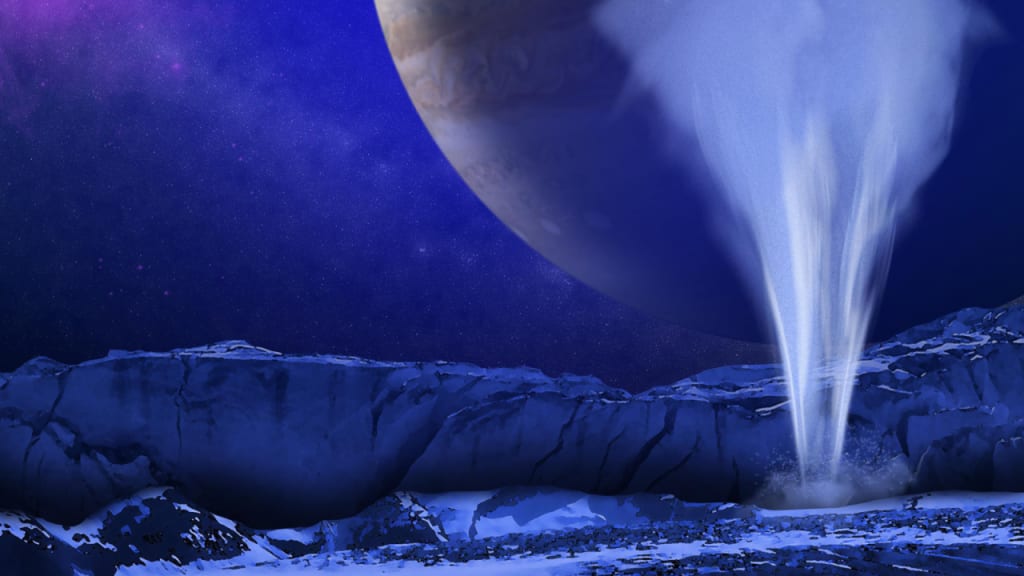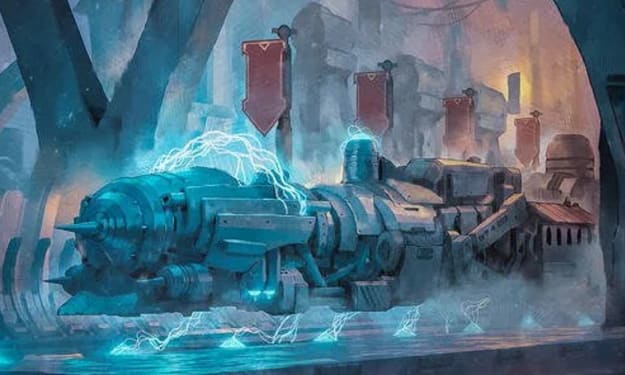"Pressure"
Beneath miles of ocean or in the depths of space, pressure can determine just how long you can survive

Nobody can hear a scream in the vacuum of space, or so they say. But they’re wrong. I know, because I’ve heard the screams. In fact, I can’t stop hearing them.
We were in our eighth month of a twelve-month mission aboard the Pegasus 5, the Europa-orbiting observation and sensing platform run by the government-backed conglomerate TerraCorp. There were five of us in the crew: Mission Captain Severn Tengway, Executive Officer Mikhail Boroshnev, Chief Medical Officer Patrice D’Antonia, Payload and Engine Specialist Sarah Consdan.
And myself, Mission Exobiologist Natalie Dreypur. Hell, I didn’t even have a rank. I was the low man on the totem pole, though I believed I had the most important role of the entire mission. It was my job to determine if the cryogeysers erupting through the miles-thick Europa icesheets contained any signs of life, anything beyond microbial, that is. TerraCorp had a pending contract to mine the geysers for raw minerals, but only if there were no signs of advanced life down below.
We hadn’t had much success during the first six months. Most of our time was absorbed in just bringing the station online, calibrating the equipment, testing the sensors, and repairing the damage from the tail of an unexpected comet that passed a little too close. But during months seven and eight, we began having moderate success predicting several cryogeysers eruptions. Those predictions meant TerraCorp could have a steady supply of orbit-reaching material if those eruptions were standard and not a fluke.
That was really all we were there for: to make sure TerraCorp could turn a handsome profit. They weren’t interested in finding life in Europa’s vast oceans. This one little moon, about the size of Terra’s Moon, held more than twice as much water as all of Terra’s oceans. And because of its weaker gravity, the pressure at the very bottom was about equal to that of the deepest ocean on Terra, the Marianas Trench. We knew the gravitational tides from nearby Jupiter would create deep-crust tectonic movements, which would release enough heat from thermal vents to keep the deepest part of Europa’s oceans warm enough for all kinds of life.
I knew this. The New Worlds Oceanographic Institute that trained and sponsored me knew this. Why the Captain and the rest of the crew seemed oblivious to this was beyond me. It was so frustrating—
Sometimes, it just made me want to scream.
Day after day brought more of the same stifling and short-sighted work. The other members of the team were content to simply fulfill their corporate-centric mission rather than send a single probe down to Europa’s icy surface. The analysis I performed of the mostly liquid cryogeysers was something any level three scanner could do. I yearned for permission to use the station’s other sensors to scan through the ice caps into the deep oceans for more advanced lifeforms.
“Forbidden,” Captain Tengway reminded me for the umpteenth time. In an intentionally bored voice, he stared at the curved white ceiling and recited, “Interplanetary Exploration and Settlement Code Section Seven, Subsection Two, Paragraph One states, ‘No biotic, robotic, or androidic operator will employ any form of technological sub-surface scanning or investigation on the following solar bodies: Europa—’”
He paused for effect. “Note, Dreypur, they mention Europa first. Now, why d’ya think that is? Maybe because they have a damned good reason for not disrupting the lifeforms down there!”
“Aha!” I replied. “So you agree there are lifeforms in Europa’s oceans!”
Tengway rolled his neck as the other three members of the crew tried to ignore our latest argument. Instead, they focused their attention on the various monitors and readouts that displayed the chemical and mineral makeup of the cryogeysers. Captain Tengway explained, “We’re not allowed, because we’re not allowed. We don’t ask why, because we’re ordered not to ask questions for which we don’t have the answers.” He rubbed his hands in the chilly reconstituted air of Central Bay. “And that’s that.”
“But isn’t that why we’re out here?” I replied, not willing to give in. “To explore? To learn? To find out what’s behind the boundaries we've set for ourselves?”
“Our mission,” Exec Boroshnev replied, “is to analyze these cryogeysers, and find out if it’s financially feasible to harvest the minerals contained within.” And right on cue, the conversation among those four turned to the valuation of observable rare metals, distillation times, collection limits—anything and everything but whether there was intelligent life in Europa’s oceans.
The ensuing days turned into weeks, during which I felt increasingly stifled. I’m certain the rest of the crew could feel my waning support for the mission, and increasingly failed to chastise me for missing mandatory meetings and technical briefings.
On Day 263, the main comm relay dish indicated a transmission fault in a secondary circuit. Normally, the replacement swapout would have been performed by Payload Specialist Consdan, but I decided to volunteer to do the EVA instead.
I needed a break from them, and I bet they needed a break from me. They agreed to my request instantly.
Outside the station, in the stillness and emptiness of space, I felt oddly complete. Addition by subtraction, they called it back on Terra: removing a negative from the equation gave a more positive solution, just like swapping out the faulty relay in the comm unit provided a proper circuit connection.
The swapout took less than twenty minutes. I still had a good two hours of air and more than double that in consumables, so I began a long and in-depth personal introspection. Why was I on this mission, I mean, what was I really doing here? What could I hope to gain? What was my ultimate purpose?
Floating on my back, staring up at the immense bulk of Jupiter—the planet Boroshnev called “Big Papi”— I began to ask meaningful questions about Life, the Universe and Everything. As I slowly rotated to face Europa far below, I gazed down at its deceptively smooth surface. I realized if there were indeed an advanced race inhabiting its oceans, they might have advanced without the use of any technology. That would mean they might have surpassed us in some areas like psychic or psionic skills, areas that could be useful in communicating across the moon’s vast oceans, like the way Terra’s ocean denizens developed whale song.
If they had, then they could probably hear me, and might even be able to answer me.
My inner monologue transformed into a dialogue with an imaginary being, a cross between a humanoid porpoise and an angelic mermaid. I pictured the creature first as it might be swimming down below the surface, then floating in space, then as an almost perfect human sitting on a protruding torsion beam of the space station beside me. She wouldn’t have a need for the bulky space suit that I was wrapped in, so she rested there in a chiffon gown of shifting greens and blues, like the depths I pictured in the oceans below. The edges of her face were limned with some feature that might have been gills, or a second set of ears that received and transmitted psychic message. Her fingers were splayed like I’d have expected on an aquatic creature, and her legs seemed to have some sort of diaphanous fin connecting them.
She looked into my eyes, and I felt she reached into my very soul. I felt a connection that I had never felt back on Terra, a connection that almost brought me to tears.
Her angelic, alien-tinged face haunted me the rest of that night. I could barely sleep.
I woke early the next day for another EVA, ostensibly to check on the repaired comm unit. When I was outside in the quiet stillness of space, I could see the team inside behind the thick windows of Central Bay, huddled together and looking out at me in space, whispering to themselves, doubting me, worrying about me.
It’s possible they weren’t really all that interested in me, and that they were weren’t huddled together at all, and were simply performing their normal research duties. But at that moment, I didn’t care.
My Europan companion had returned, sitting on the same extruded beam where I last saw her—Him? It?—the day before. I briefly considered that she might be a figment of my imagination. But I needed that connection, that validation of myself and my true mission.
Did I have a different mission than the one I was sent on by the Institute? She responded “Yes” to that unvoiced question, replying to me in a combination of telepathy and sign language. I understood part of that reply and intuited the rest.
I began to hear in my head her… I don’t know exactly what it was, but it felt to me like a whale call. I felt it as much as heard it. I knew I shouldn’t have been able to hear any creature from hundreds of miles away, out here in the vacuum of space. That small part of my mind that still clung to the scientific principle knew that simply wasn’t possible. Still, the depth of the communication and the realness of the image of a nearly perfect human woman sitting calmly on the exterior of the station seemed so real, and more importantly so calming and reaffirming, that part of me accepted this impossibility without hesitation. I needed to believe this, and so I did.
More days passed, and I spent as much time doing EVAs as I possibly could. Since we reconstituted most of our air and distilled our own water, consumables weren’t really an issue, and I think the rest of the crew was happy to have me out of their hair. When I was outside, I seemed to simply float, sometimes alone, sometimes with my friend. My imaginary contact, whom I decided for no apparent reason to call Pearl, shared her concerns that we humans would eventually exploit the subsurface and destroy “their” environment, the way we’d done to Terra’s oceans.
Watching me from inside the station, Captain Tengway must have had some internal concerns about my conduct. I’m sure he preferred that I spent more time out away from the rest of the crew, which allowed them to get their work done without me challenging the overall mission. However, on Day 287 when an anomaly appeared on their cryogeyser sensors, signs of something organic in the frozen liquid streams that was more than just microbes, they needed my expertise.
“Watch out,” Pearl cautioned me. “They won’t understand. They won’t want you to do the right thing.”
“Do the right thing.” Those words echoed in my mind.
Pearl’s message weighed on my mind as, back inside, I realized the data showed some form of biologic combination of oxygen and salinity with traces of methane and sulfur, an undeniable indication of advanced lifeforms. But instead of welcoming such news, which last month I would have been ecstatic over, I was now willing to cover up these signs in order to protect… To protect whatever made them.
With a shrug, I told the crew these were just signs of the normal decay of millions of years of microscopic organisms, stirred up from the bottom of the deep oceans, probably from a recent geologic shift or tectonic anomaly. The crew was rightly confused and more than a little suspicious of my pat answer, but they didn’t press me.
The next day, I was outside again, wondering what I could do to deny the obvious truth about the creatures of the ocean. I looked inside the station and saw them plotting against me. This time, they were gathered near the umbilical connections to my EVA suit, occasionally looking over at me outside the windows. I knew that in reality, they might have been listening to Medical Officer D’Antonia explaining how being outside of the station’s artificial gravity could affect the brain, causing swelling of the cranial fluid, which in turn could cause eyesight problems as well as cognitive issues.
“You mean, hallucinations?” Tengway said.
The Med Officer nodded in agreement, looking out at me floating in my EVAC suit at the very end of the umbilical. But I thought, I believed they were conspiring against me.
I was sure of it. Pearl agreed.
In discussion with my hallucinatory friend, I decided I couldn’t allow the crew to learn the truth about the others like Pearl. I decided to take action. Pearl pointed to my left, and I knew, quick and decisive action was within my reach. I turned off my comm link, so that I wouldn’t be influenced by their words.
From that moment on, I would listen only to Pearl.
By grasping the exterior handrails, I swung around towards the outer controls that connected the external oxygen-nitrogen tanks to the station’s reconstituted atmosphere pumps, but the limitation of my umbilical cord prevented me from reaching them.
The crew inside realized what I was attempting, and raced to figure out what they could do to stop me. Exec Officer Boroshnev pleaded with me through the thick Com Bay windows to stop, while the Captain and the Med Officer tried to slow me down by interrupting my own flow of oxygen. Payload Specialist Consdan simply jettisoned my umbilical, which meant I had only a limited supply of onboard oxygen left. But it also meant I was no longer tied to the station.
She thought she could blast me away from the station with a shot from the orientation thrusters.
She was wrong.
The Captain realized, a little too late, that I would have been unable to reach the exterior atmosphere controls if they had kept my umbilical in place. He stared at me incredulously, shaking his head back and forth, silently.
With only a little regret, I began shutting down the atmosphere controls for the station. I knew they might just do their own EVA and turn them back on, so I moved back to the main exit and disabled the hatch release by causing a small explosion. But the blast, tiny as it was, did what the orienting thrusters couldn’t do: it threw me away from the station, sending me hurtling down towards Europa’s icy surface.
The last image I had of the station was the crew of four gathered around the airlock window, screaming in complete silence, as I drifted down and away.
Drifting in space, I saw my hallucinatory friend Pearl one last time. She was accompanying me, plummeting downward as fast as I. She expressed through telepathic means a sort of satisfaction and gratitude that I had managed to spare Europa’s oceans, if only for a little while longer.
From my hurtling position, I looked down and gazed at the vast ice-covered oceans racing up to meet me, knowing that at some point, I would crash into them and be liberated from my mortal shell. I hoped the inhabitants of the ocean, whatever form they might be, would welcome my spirit. I closed my eyes and accepted my impending fate.
The last thing I thought I heard was the silent screaming of the crew of the Pegasus 5. I’ll never be able to get those screams out of my head.
Far below the dozens of miles of cracked ice lay a dark and nearly opaque body of water, more dark pit than ocean as humans understood the word. Tiny plankton, almost microscopic in size, are all that could be seen, floating here and there like grains of sand. These must have been the life forms that the station’s sensors picked up, the “advanced life” of Europa.
Until a dark shape swam past, a massive bulk greater in size than the lifeless station itself, orbiting silently far above.
About the Creator
David White
Author of six novels, twelve screenplays and numerous short scripts. Two decades as a professional writer, creating TV/radio spots for niche companies (Paul Prudhomme, Wolverine Boots) up to major corporations (Citibank, The TBS Network).
Reader insights
Outstanding
Excellent work. Looking forward to reading more!
Top insights
Compelling and original writing
Creative use of language & vocab
Excellent storytelling
Original narrative & well developed characters
Heartfelt and relatable
The story invoked strong personal emotions






Comments (1)
Another Fantastic story by a very talented writer! I loved it David!